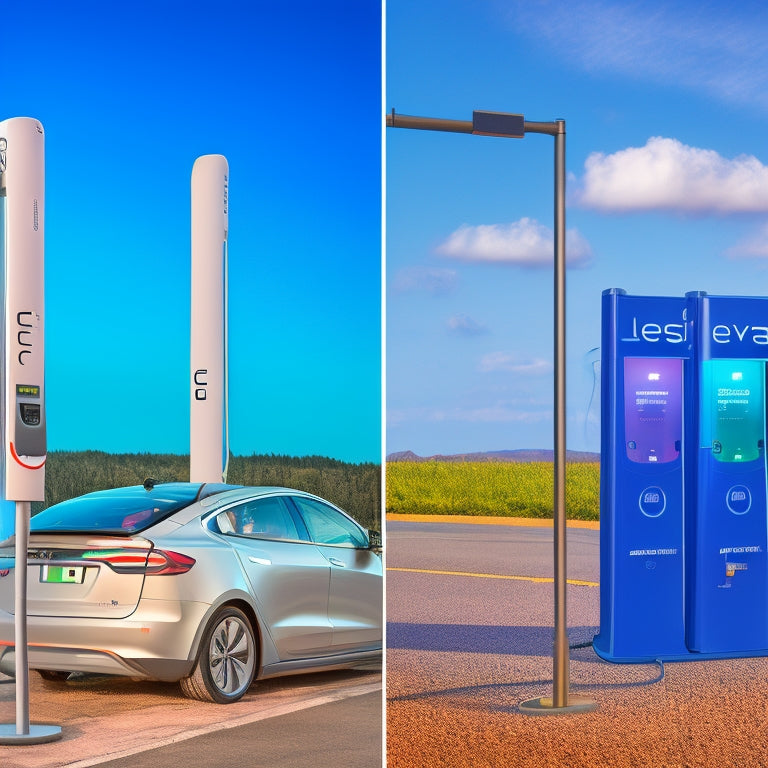
What EV Chargers Work Across Different Networks?
Share
You can charge your electric vehicle across different networks using universal adapters and chargers that support multiple brands and standards, such as CCS, CHAdeMO, and Tesla Fast Charger, ensuring hassle-free charging experiences amidst the growing network of over 2,500 stations in North America alone. Many chargers are designed for multi-brand compatibility, and the adoption of unified standards like SAE J3400 simplifies charging. Level 2 and DC Fast Chargers are widely compatible, supporting charging speeds ranging from 20-350 kW based on type and brand. As you investigate the world of EV charging, you'll find that the possibilities for seamless charging are expanding rapidly.
Key Takeaways
- Many EV chargers are designed for multi-brand compatibility, adopting unified standards like SAE J3400 to simplify charging across networks.
- Universal EV charging adapters, such as Level 1 to Level 2 and J1772 to CCS, bridge gaps between charging networks and vehicle types.
- Open charging network standards facilitate communication between chargers and vehicles, promoting network interoperability across various charging networks.
- Network agnostic charging solutions interact with multiple charging infrastructure providers, guaranteeing a unified user experience across networks.
- Cross-network charging membership options, such as RFID cards and mobile apps, offer universal charger cards for network access and simplify charging at multiple stations.
Major EV Charging Networks
Major EV charging networks have emerged as an essential infrastructure component to support the growing adoption of electric vehicles. As you investigate the EV environment, you'll notice that these networks are expanding rapidly, driving charging network growth and improving the overall user experience.
Remarkably, leading providers like Tesla, ChargePoint, and EVgo are pioneering the development of EV tech and charging infrastructure, with Tesla Supercharger Network boasting over 2,500 stations in North America. You'll have access to a vast network of public charging stations, making long-distance travel and daily commutes more convenient.
With multiple networks available, you'll have the freedom to choose the one that best suits your needs. Some popular networks include ChargePoint, Electrify America, and EVgo. These networks offer various features, such as real-time station availability, route planning, and payment options, to make your EV ownership experience seamless.
Charger Compatibility Across Brands
As you explore the vast network of EV chargers, you'll likely encounter a mix of brands, each with their own set of chargers and connectors. This raises questions about charger compatibility across brands.
Fortunately, many chargers are designed to work with multiple brands, giving you more flexibility. The adoption of unified standards like SAE J3400 has simplified the charging experience, allowing seamless integration of various EV models with charging infrastructure.
You'll find that Level 2 (240V) and DC Fast Chargers are the most widely compatible, with charger types like Combined Charging System (CCS), CHAdeMO, and Tesla Supercharger supporting multiple brands.
Charging speeds also vary, ranging from 20-350 kW, depending on the charger type and brand. Understanding these factors will help you traverse the intricate environment of EV charging and guarantee seamless charging experiences across different networks.
Open Charging Network Standards
You're likely to find that one essential aspect of EV charging networks is the adoption of open standards, which facilitate seamless communication between different chargers and vehicles.
These open standards enable charging protocols to operate across various networks, ensuring network interoperability. The growth in EV adoption, driven by government policies and increasing investment in renewable energy sources Market Trends in EV Charging, has accelerated the need for standardized communication protocols.
Standardization efforts, driven by collaborative initiatives, have led to the development of common language and design for EV charging. This, in turn, enhances the user experience, allowing you to charge your vehicle effortlessly across different networks.
Regulatory structures and technology integration also play a key role in promoting open standards, thereby nurturing a more unified and convenient EV charging ecosystem.
Universal EV Charging Adapters
You'll encounter various universal EV charging adapters on the market, each designed to bridge the gap between different charging networks and vehicle types.
As you investigate these adapters, you'll need to understand their types, such as Level 1, Level 2, and DC Fast Charging adapters, as well as their compatibility and limitations.
With the growth of charging stations in urban areas, such as malls and grocery stores, and the expansion of charging networks like EVgo, Electrify America, and ChargePoint, it's crucial to find adapters that work seamlessly across different networks.
Adapter Types Explained
Five types of universal EV charging adapters are available in the market, each serving a specific purpose and catering to diverse charging needs.
You'll find adapters that support different charging protocols, ensuring you can charge your EV across various networks. With the cost of installation ranging from $500 to $50,000+ installation costs overview, it's crucial to choose the right adapter for your needs.
Additionally, solar-powered stations can lead to potential tax credits, grants, and carbon credits, increasing revenue opportunities.
- Level 1 to Level 2 Adapter: Converts 120V to 240V charging, allowing you to charge faster at home.
- J1772 to CCS Adapter: Enables charging at DC Fast Charging stations with a Combined Charging System (CCS) connector.
- J1772 to Tesla Adapter: Allows Tesla owners to charge at non-Tesla Level 2 charging stations.
- CCS to J1772 Adapter: Enables non-Tesla EVs to charge at Tesla Supercharger stations.
- 3-Phase Adapter: Supports 3-phase charging, ideal for commercial or industrial charging applications.
Compatibility and Limitations
When choosing a universal EV charging adapter, compatibility and limitations are essential considerations to ascertain seamless charging experiences across different networks.
You'll want to verify the adapter is compatible with various charging infrastructure, such as Level 2 and DC Fast Charging stations. Additionally, consider the adapter's power output and whether it can handle your vehicle's maximum charging capacity.
Limitations may include the adapter's physical size, cable length, and durability. A compatible adapter will provide a hassle-free user experience, allowing you to charge your EV without worrying about connectivity issues.
Cost and Availability
As you've guaranteed seamless charging experiences across different networks by considering compatibility and limitations, now it's time to examine the financial aspect of universal EV charging adapters.
Key factors influencing cost and availability include:
- Charging costs varying by network, region, and energy pricing
- Installation expenses, including hardware and labor costs
- Maintenance fees, which can add up over time
- Subsidy programs and government incentives that can offset costs
- Market demand and regional pricing, which impact charging infrastructure development and user behavior
Network Agnostic Charging Solutions
With the proliferation of EV chargers across different networks, a seamless charging experience relies on network agnostic charging solutions that can bridge the gap between varying platforms.
You need a solution that can interact with multiple charging infrastructure providers, allowing you to charge your EV without worrying about compatibility issues.
A network agnostic charging solution guarantees a unified user experience, providing you with the freedom to charge your vehicle anywhere, anytime.
This approach eliminates the need to create multiple accounts or carry multiple cards, simplifying the charging process and making it more convenient.
Cross-Network Charging Membership
When you need to charge your EV across different networks, you'll want to evaluate cross-network charging membership options.
These programs typically offer network access through universal charger cards or other means, allowing you to charge your vehicle at various stations.
You'll need to weigh the benefits of each network access option to determine which one best fits your EV charging needs.
Network Access Options
Your EV charger's network access options play an essential role in facilitating cross-network charging. When you're on the go, you want the freedom to charge your vehicle at any station, regardless of the network.
That's where network integration comes in - it allows your charger to seamlessly connect with different charging infrastructure providers.
Some network access options to evaluate include:
- RFID cards: physical cards that grant access to specific networks
- Mobile apps: smartphone apps that allow you to find and pay for charging sessions
- Plug-and-charge: a technology that enables charging without the need for authentication
- Network roaming agreements: partnerships between networks that enable cross-network charging
- Open charging protocols: standardized communication protocols that facilitate network integration
Universal Charger Cards
Having multiple network access options can be cumbersome, but universal charger cards offer a streamlined solution.
You no longer need to carry multiple cards or remember numerous login credentials. With a universal charger card, you can access various EV networks seamlessly, giving you the freedom to charge your vehicle wherever you go.
These cards provide a single, convenient way to pay for charging across different networks, eliminating the need for multiple accounts or memberships.
Future of Interoperable Charging
As electric vehicles (EVs) become increasingly mainstream, the need for seamless charging experiences across different networks grows more pressing.
You'll likely want to charge your EV anywhere, anytime, without worrying about compatibility issues. The future of interoperable charging holds much promise, with efforts underway to standardize charging infrastructure and facilitate consumer benefits.
-
Open charging networks will enable you to charge your EV at any station, regardless of the network or provider.
-
Standardized payment systems will simplify the billing process, eliminating the need for multiple accounts or cards.
-
Increased grid capacity will support the growing demand for EV charging, reducing strain on the electrical infrastructure.
-
Advanced technologies like vehicle-to-grid (V2G) charging will enable your EV to supply energy back to the grid when not in use.
-
Seamless roaming agreements will allow you to charge your EV on the go, without worrying about network compatibility.
Frequently Asked Questions
Can I Use My Home Charger to Charge My EV on the Go?
Did you know 80% of EV owners charge at home? You can't use your home charger on the go, but you can invest in mobile charging solutions like portable chargers, designed for flexibility and convenience, to charge your EV anywhere, anytime.
Are All DC Fast Chargers Compatible With Each Other?
When you're on the go, you'll find that not all DC fast chargers are compatible with each other due to varying charging standards, power levels, and connector types, limiting your charger options and freedom.
Do Public Chargers Charge at the Same Speed as My Home Charger?
You'll be surprised to know that 80% of EV owners charge at home, where you enjoy a constant 240-volt flow. Public chargers, however, can vary in charging speed, often maxing out at 50 kilowatts, whereas your home charger can deliver up to 19.2 kilowatts, making home charging a faster, more convenient option.
Can I Charge My EV Abroad With My Existing Charging Account?
You can charge your EV abroad with your existing charging account, but it depends on the international compatibility of your charging network; research which networks have roaming agreements to guarantee seamless charging on foreign roads.
Are There Any EV Chargers That Don't Require a Membership or Subscription?
You'll be surprised to know 80% of EV owners prefer pay-as-you-go charging! You don't need a membership or subscription with chargers like Electrify America, offering network compatibility and convenient charging accessibility, giving you the freedom to roam.
Related Posts
-

Why Merge Earth's Heat With Sun's Energy?
You're about to utilize the full potential of renewable energy by combining the Earth's natural heat with the Sun's a...
-

3 Earth-Loving Furniture Tips for Energy-Smart Homes
When furnishing your energy-smart home, you have the power to reduce your carbon footprint greatly by making consciou...
-

Gamify Your Home's Energy Generation and Savings
You're taking the next step in optimizing your home's energy generation and savings by utilizing the power of gamific...


